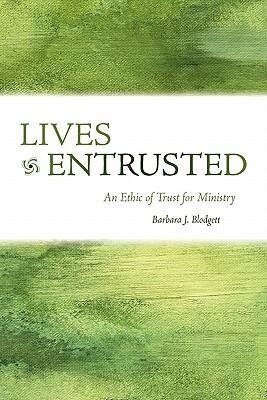Barbara J. Blodgett, Lives Entrusted: An Ethic of Trust for Ministry. Fortress Press, 2008.
Referenced in: Ministry Ethics
LifeandLeadership.com Summary
This is a hard-hitting but refreshing look at ministry ethics, with emphasis on one major area: trust. Blodgett discusses how trust is built and broken. Most ministry ethics books focus on the behavior and quality of ministers as individuals, which is good, but she suggests most discussions overlook the fact that ministry is done in the context of community and relationships where trust is paramount. She emphasizes that trust is fundamentally transactional, not personal. She also suggests that most ministers and churches approach their relationships much too easily, slipping into “easy modes of communicating, like gossip and spin, that prevent or undermine trust.”
The following comes from the introduction (2-4), where Blodgett summarizes her book. Chapter one defines trust, arguing that trust always involves risk, vulnerability, and power. She says risk should be appropriate to the level of trust, with vulnerability acknowledged by both truster and entrusted, and the power between them balanced as much as possible. Chapter two discusses confidentiality, where she challenges the idea that ministers should keep silent everything they hear, which is built more on a “therapeutic” model that does not take the presence of community into account. She argues that confidentiality should be maintained once promised, but that it should be promised less often. She “invites us to imagine a community wherein ministers are not solely burdened with anyone else’s secrets, but rather where they facilitate relationships of appropriate vulnerability among those they serve.” Chapter three discusses ministerial misconduct, where she expresses concern over the proliferation of “audit” procedures, which are based on suspicion and distrust, and suggests additional measures that seek a more trust-based prevention of misconduct. Chapter four discusses gossip, or “informal conversation about others enjoyed at their expense.” She calls this a cowardly form of expression, and suggests a form of testimony, which is direct and self-authored. Chapter five takes up the subject Blodgett refers to as “Bullshit” as not caring one way or another about truth, and deceiving listeners by pretending to be sincere and authentic. It tries to make easy what is not – talking meaningfully about Christian faith.
Blodgett’s candor cuts through a lot of what passes as authentic ministry but is not. Even if one does not agree with all her conclusions, it is an excellent text.
From the Publisher
Behind all the issues of ministerial conduct and character lies a simple reality. The heart of ministerial ethics and integrity, argues Barbara Blodgett, is trust – trust expected, trust earned, trust practiced. Trust, she says, is undermined by three trust-busters common in the church: secrecy, gossip, and lying.
For Blodgett, trust is not an emotion or intention but a transaction. People entrust each other with things they value, and that interaction endows a relationship. In the aggregate, they create community. By focusing on crucial practices of trust, a unique new framework for ministerial identity and ethics is created.
About the Author
Barbara J. Blodgett is Director of Supervised Ministries at Yale Divinity School in New Haven, Connecticut. A former pastor ordained in the United Church of Christ, she is also an ethicist whose writings have appeared broadly.
***For additional information on this resource, including reviews, click the bookstore links. Check the reference at page top or the links below for resource guides on related topics.***
See Resources on Over 100 Ministry Topics:


